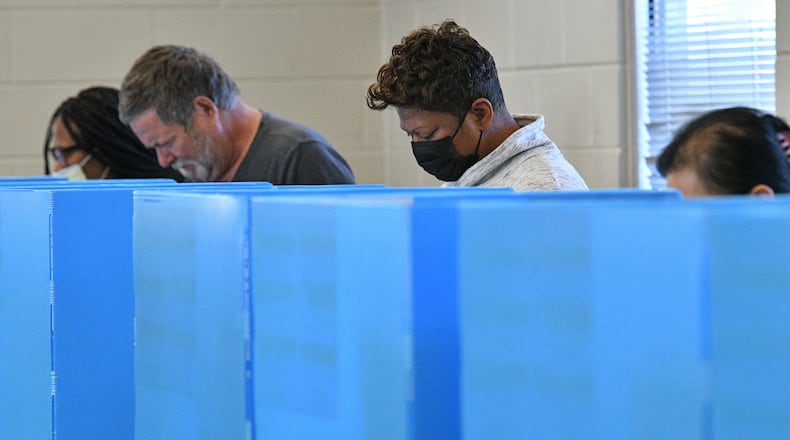Early voting won’t be allowed on a Saturday before the U.S. Senate runoff in Georgia because it’s the day after the state holiday formerly known as Robert E. Lee’s Birthday and two days after Thanksgiving.
Georgia election officials said this weekend that state law prohibits in-person early voting on Saturdays if a holiday is within two days beforehand.
The restriction on Saturday voting leaves five days of required in-person early voting on the weekdays before the Dec. 6 runoffs. County governments will have the option to offer up to three more early voting days starting the day after the results of the initial election are certified, potentially on the Tuesday and Wednesday before Thanksgiving and the Sunday afterward.
Secretary of State Brad Raffensperger had said last week that voters would have a Saturday voting opportunity before the runoff, but his office’s attorneys later learned it wasn’t allowed under state law.
“It’s not our choice. It’s literally in black-letter law that the Saturday following a state holiday cannot be used for early voting,” said Gabriel Sterling, chief operating officer for the secretary of state’s office. “We all thought there was going to be Saturday voting until we looked at the law really closely.”
The General Assembly passed the law restricting Saturday voting after holidays in 2016, but it wasn’t an issue in previous runoffs because at the time, they took place nine weeks after Election Day, long after Thanksgiving and the State Holiday.
The voting law passed last year, Senate Bill 202, moved runoffs to four weeks after Election Day, creating the scheduling conflict.
Voting rights advocates criticized the limitations on early voting opportunities in runoffs.
“A Confederate holiday should not prevent the protection of democracy, which is called voting. That holiday needs to be eliminated,” said Gerald Griggs, president of the Georgia NAACP, the nation’s oldest civil rights organization.
Before general and primary elections, Georgia law requires at least 17 days of in-person early voting, including two mandatory Saturdays and two optional Sundays. In runoffs, five days of early voting are mandated. Early voting is prohibited the weekend before election day.
The American Civil Liberties Union of Georgia disagreed with the secretary of state’s interpretation of state law, saying language preventing Saturday voting was only meant to apply to the three-week early voting period before regularly scheduled elections.
“Jim Crow still exists here,” said Hillary Holley, executive director of the domestic worker organization Care in Action. “Fighting for counties to offer as many days and hours as legally possible is critical.”
For decades until late 2015, Georgia had a state holiday on the day after Thanksgiving memorializing Robert E. Lee, the Confederate general during the Civil War.
Gov. Nathan Deal changed the day’s name to a more neutral title, “State Holiday,” which is still observed on the same day of the calendar.
Then in last year’s voting law, the Republican majority in the General Assembly shortened the runoff period following the defeats of Republican Sens. Kelly Loeffler and David Perdue in runoff elections on Jan. 5, 2021. The runoffs gave Democrats control of the U.S. Senate following wins by Democrats Raphael Warnock and Jon Ossoff.
This year’s runoff features Warnock and Republican Herschel Walker after neither candidate won more than 50% of the vote in last week’s election.
Early voting will begin after counties complete an election audit this week and then Raffensperger certifies the results, which could occur as soon as Nov. 21, according to the secretary of state’s office.
Early voting dates before U.S. Senate runoff
Required: Monday through Friday, Nov. 28 to Dec. 2
Optional: Tuesday, Nov. 22; Wednesday, Nov. 23; Sunday, Nov. 27. County election boards can decide whether to offer early voting on these days.
Note: Early voting would begin after Secretary of State Brad Raffensperger certifies results of the initial election, which could occur as soon as Nov. 21.
About the Author
Keep Reading
The Latest
Featured




